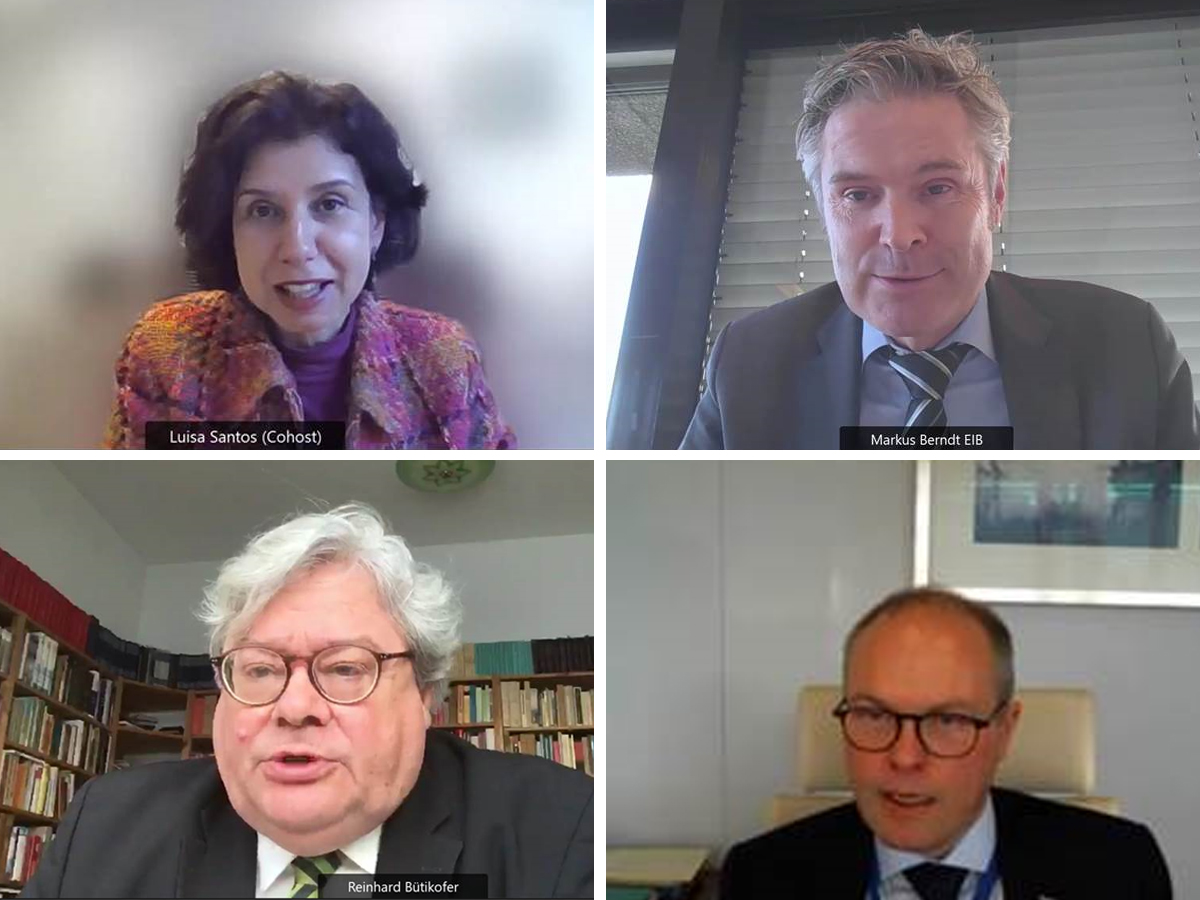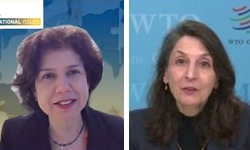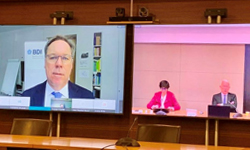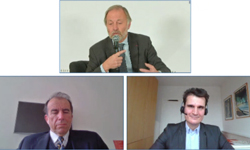BusinessEurope Headlines No. 2022-02
Debating the EU Global Gateway initiative

“Connectivity networks are the nuts and bolts that make global exchange and cooperation possible. They are crucial for business competitiveness and for meeting the sustainable development and climate goals. It is therefore key that the EU plays a more active role in this area”, said Luisa Santos, Deputy Director General of BusinessEurope, at a webinar on the EU Global Gateway initiative that BusinessEurope hosted on 20 January. Santos moderated the event, which had the participation of Taneli Lahti, Head of Cabinet of the EU Commissioner for International Partnerships Jutta Urpilainen; Markus Berndt, Director for Group Strategy at the European Investment Bank; and Reinhard Bütikofer, Member of the European Parliament and chair of the parliament’s China delegation. “It is now key for the EU to translate the momentum created by the announcement of its Global Gateway Initiative into concrete steps. The European business community stands ready to support the EU and Member States in their efforts to do so”, Santos concluded.
![]() Contact: Benedikt Wiedenhofer
Contact: Benedikt Wiedenhofer
Morning Talks on International Issues with WTO Deputy DG Angela Ellard
 On 25 January, the third edition of the online event “Morning Talks on International Issues” took place with the Deputy Director General of the World Trade Organisation (WTO), Angela Paolini Ellard as guest. The discussion focused on the impact of covid-19 on trade and the role of the WTO in monitoring measures, mapping out supply chains and facilitating trade in health-related products, as well as on maintaining the momentum ahead of the twice postponed 12th WTO Ministerial Conference. Ellard is convinced that WTO members are committed to making progress in areas such as trade and health, intellectual property rights, a fisheries subsidies agreement, the trade and gender agenda. She also referred to the increased attention to climate and the environment and the role that the WTO can play in assisting members develop cogent policy choices, including on carbon pricing.
On 25 January, the third edition of the online event “Morning Talks on International Issues” took place with the Deputy Director General of the World Trade Organisation (WTO), Angela Paolini Ellard as guest. The discussion focused on the impact of covid-19 on trade and the role of the WTO in monitoring measures, mapping out supply chains and facilitating trade in health-related products, as well as on maintaining the momentum ahead of the twice postponed 12th WTO Ministerial Conference. Ellard is convinced that WTO members are committed to making progress in areas such as trade and health, intellectual property rights, a fisheries subsidies agreement, the trade and gender agenda. She also referred to the increased attention to climate and the environment and the role that the WTO can play in assisting members develop cogent policy choices, including on carbon pricing.
Contact: Sofia Bournou, Elena Suárez
Dialogue with the French Presidency on Fit for 55 package
 Europe can be a leader in the coming transition – but for that to happen, the first movers in business and industry will need more support, so they can have the confidence necessary for the massive investments needed. This was one of the key messages passed by the Chairman of BusinesssEurope’s Industrial Affairs Committee and Deputy Director General of the Federation of German Industries (BDI), Holger Lösch at a panel debate co-organised by BusinessEurope and MEDEF, the French Business Association, on 26 January. The event brought together representatives from business, the French government and civil society to discuss the outlook and plans of the presidency of the Council of the EU for the negotiations around the Fit for 55 package. Thomas Courbe, Director General for Enterprises in the French Ministry for Economy, Finance and Recovery re-iterated that France would work towards keeping the package as one in the upcoming months, but also confirmed that they see the emissions trading system and the carbon border adjustment mechanism as particularly important files. In the discussion, Laurence Tubiana, CEO of the European Climate Foundation urged policy-makers to consider the social impacts of the different measures, while also staying true to the ambition in the European Climate Law. Panellists agreed that realising the 2030 targets will require a massive cooperative effort by lawmakers, industry and consumers.
Europe can be a leader in the coming transition – but for that to happen, the first movers in business and industry will need more support, so they can have the confidence necessary for the massive investments needed. This was one of the key messages passed by the Chairman of BusinesssEurope’s Industrial Affairs Committee and Deputy Director General of the Federation of German Industries (BDI), Holger Lösch at a panel debate co-organised by BusinessEurope and MEDEF, the French Business Association, on 26 January. The event brought together representatives from business, the French government and civil society to discuss the outlook and plans of the presidency of the Council of the EU for the negotiations around the Fit for 55 package. Thomas Courbe, Director General for Enterprises in the French Ministry for Economy, Finance and Recovery re-iterated that France would work towards keeping the package as one in the upcoming months, but also confirmed that they see the emissions trading system and the carbon border adjustment mechanism as particularly important files. In the discussion, Laurence Tubiana, CEO of the European Climate Foundation urged policy-makers to consider the social impacts of the different measures, while also staying true to the ambition in the European Climate Law. Panellists agreed that realising the 2030 targets will require a massive cooperative effort by lawmakers, industry and consumers.
Contact: Steffen Engling
How universities can help better respond to skills needs on labour markets
 Universities have a key role to underpin the digital and green transitions as a key vector of knowledge, innovation and skills. Strengthening the interplay between skills, innovation and training will in turn help to increase companies’ capacity to innovate, bring new products to market and ultimately boost an innovation culture. In terms of their education function, universities have a key role to help address labour shortages and to respond to the long-term challenges posed by structural skills mismatches. Improving cooperation with employers and widening access through short courses and micro-credentials will also help universities to offer more labour market relevant education and training to adults. Improved guidance to students in high schools and universities is also an important area of progress to improve the matching of students’ expectations and career choices with the available employment opportunities on the labour markets. For example, achieving a higher number of STEM (science, technology, engineering, and mathematics) graduates remains key for Europe’s economic success. These were the key messages given by Maxime Cerutti, BusinessEurope Director of Social Affairs during the Forum of Universities for the Future of Europe that took place at the initiative of the French presidency of the Council of the EU on 26 January.
Universities have a key role to underpin the digital and green transitions as a key vector of knowledge, innovation and skills. Strengthening the interplay between skills, innovation and training will in turn help to increase companies’ capacity to innovate, bring new products to market and ultimately boost an innovation culture. In terms of their education function, universities have a key role to help address labour shortages and to respond to the long-term challenges posed by structural skills mismatches. Improving cooperation with employers and widening access through short courses and micro-credentials will also help universities to offer more labour market relevant education and training to adults. Improved guidance to students in high schools and universities is also an important area of progress to improve the matching of students’ expectations and career choices with the available employment opportunities on the labour markets. For example, achieving a higher number of STEM (science, technology, engineering, and mathematics) graduates remains key for Europe’s economic success. These were the key messages given by Maxime Cerutti, BusinessEurope Director of Social Affairs during the Forum of Universities for the Future of Europe that took place at the initiative of the French presidency of the Council of the EU on 26 January.
Contact: Robert Plummer
Trade agreements: the importance of EU domestic advisory groups
 “The domestic advisory groups (DAGs) play a key role in monitoring the implementation of the trade and sustainable development chapters of EU Free Trade Agreements (FTAs)”, said Benedikt Wiedenhofer, Adviser in the International Relations department of BusinessEurope, at a session of the European Parliament Committee on International Trade (INTA) on 25 January. He was invited to speak in his capacity as chair of the EU DAG for the FTA with Colombia, Ecuador, and Peru. The session aimed at informing Members of the European Parliament about the functioning of different EU domestic advisory groups as well as the challenges they face in their work. “BusinessEurope is an active member of all existing EU DAGs, and we will be happy to leverage this expertise to contribute to the ongoing review of the EU approach to trade and sustainable development in its trade agreements. We look forward to engaging with the European Parliament on this important issue”, he stated.
“The domestic advisory groups (DAGs) play a key role in monitoring the implementation of the trade and sustainable development chapters of EU Free Trade Agreements (FTAs)”, said Benedikt Wiedenhofer, Adviser in the International Relations department of BusinessEurope, at a session of the European Parliament Committee on International Trade (INTA) on 25 January. He was invited to speak in his capacity as chair of the EU DAG for the FTA with Colombia, Ecuador, and Peru. The session aimed at informing Members of the European Parliament about the functioning of different EU domestic advisory groups as well as the challenges they face in their work. “BusinessEurope is an active member of all existing EU DAGs, and we will be happy to leverage this expertise to contribute to the ongoing review of the EU approach to trade and sustainable development in its trade agreements. We look forward to engaging with the European Parliament on this important issue”, he stated.
Contact: Benedikt Wiedenhofer
Calendar 
- 28 January: More sustainable and responsible trade
- 8-12 February: EU Industry Days
- 9 February: BusinessEurope event: The future of the emissions trading system and industrial competitiveness in Europe
- 17-18 February: European Union - African Union summit
Not yet a subscriber? Register here.
Reminder: please have a look at our privacy policy